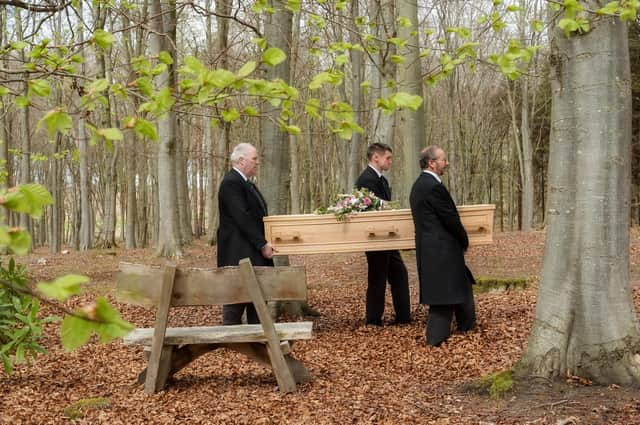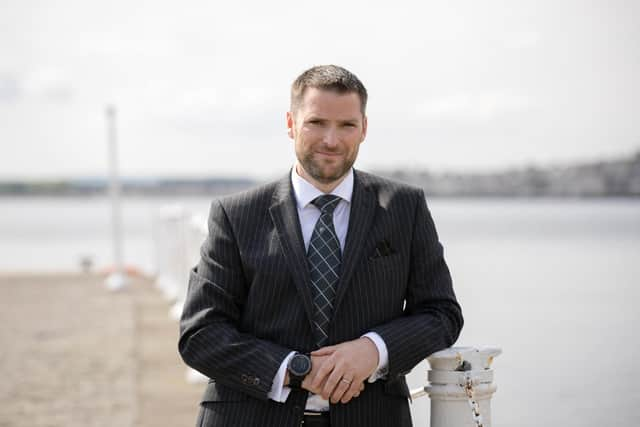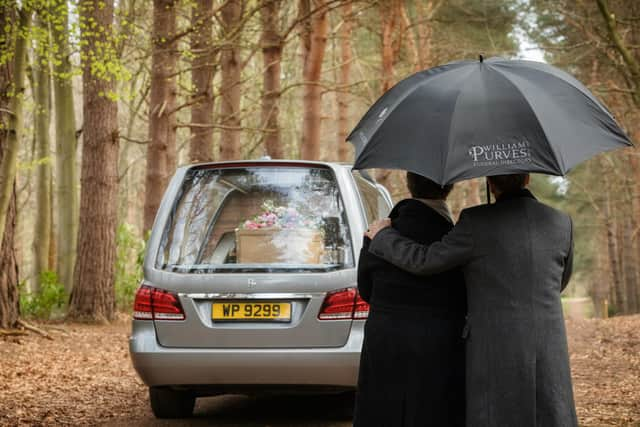The Edinburgh funeral director making the hardest of years a little easier for those mourning loved ones


As of today, 4,069 people in Scotland have passed away from Covid-19. The death tolls we have become all too eerily familiar with and now expect as part of daily briefings can sometimes feel too much to bear. But for the families, friends, loved ones left to deal with the devastation of loss this year, the rules and restrictions making the grieving process that much harder have served an additional blow.
After 20 years working at family funeral director business William Purves Funeral Directors, Tim Purves had a wealth of experience and knowledge helping him deliver the perfect send off for those who have passed and their families. But when the pandemic brought with it sweeping changes to our usual ways of life, he and funeral directors across the UK and the world had to scramble to find solutions fast.
Advertisement
Hide AdAdvertisement
Hide Ad“It's funny,” Tim says, “because you sort of do this job for 20 plus years and start to think that you've seen most things. But this year particularly has been really, really challenging.”


He adds that while many in the industry would be keen to note that something always comes along to take them by surprise, the pandemic has brought with it a shock for the funeral industry.
“The biggest challenge for us as funeral directors, is we are people-people. We want to spend time with a family and be able to have a conversation with them to find out what they're looking for in a funeral.”
Adding a personal touch to ensure every funeral is unique and the deceased’s loves, passions and wants are reflected in the funeral service, is at the heart of what Tim does. So when restrictions on visiting the homes of bereaved families and those left behind are in place, this brings its own issues for Tim and his colleagues.
He explains: “There's an unspoken element when you sit down with a family and you arrange a funeral. You'll notice something in the house that shows you something about the person who has passed away - about their interests or what sort of things that they loved or enjoyed.”


“COVID has completely changed things. You don't get those same conversations; you don't get to find out these unique things about people that makes them who they are.”
Rules capping the number of guests who can attend a service weigh similarly hard for Tim. With funerals in Scotland currently limited to 20 people, there comes great difficulty in watching families be unable to grieve in the same way they once would - unable to hold or hug those from other households and forced to pick and choose who can and can’t attend from one household to the next.
“There’s not really another way to describe it other than completely heartbreaking,” Tim says, “it’s been really difficult to watch at times.
Advertisement
Hide AdAdvertisement
Hide AdIf I were to lose a close family member, all I'd want to do is give other family members a big hug, spend time with them in the house and chat about who it is that's passed away. And you can't do that right now.”
Indeed, so many of us have had to contend with saying goodbye in strange, alien ways that can feel cold or devoid of the tenderness and care with which we would typically approach the death of a loved one. To see the true impact of this on those grieving has left Tim fearing slightly for the future:
“I am a bit concerned about the longer term implications this is going to have on some people,” he explains. “I do worry that people are not really having the opportunity to say goodbye properly. And by that I mean by being close with other family members or friends. You have no idea how much a hug helps people.
Tim’s attempts to restore a sense of connectivity and intimacy to funeral services, however, has seen him turn to the capabilities of technology to bring us together no matter where we are. While livestreaming funerals has long existed as a solution to unite families scattered across the world, the pandemic realised the need to connect those closer to home.
In turn, Tim has sought to make any orders of service accessible to all who attend physically or virtually. What might seem like a small and less significant part of a service in fact allows a memento of the deceased, upholding a connection to them and their service despite the barrier to grieving and remembering posed by the presence of a computer screen between.
This sense of accessibility and finding new ways to bring friends and families together, with Tim even having created a drive-thru funeral during the pandemic, is something he hopes will lasts into the future, regardless of how the world turns in the aftermath of the pandemic.
The same, he notes is true of seeing people emerging from their homes to pay their respects to their neighbours or friends when he arrives at a family’s home with the hearse: “it is something that really hits you at the back of the throat and has probably brought some of the most emotional moments ever for me as a funeral director.”
"It’s a powerful thing,” he says “when there are only 20 people at the service, but there might have been 100 people lining the streets beforehand.”
A message from the Editor:
Advertisement
Hide AdAdvertisement
Hide AdThank you for reading this article. We're more reliant on your support than ever as the shift in consumer habits brought about by coronavirus impacts our advertisers.
If you haven't already, please consider supporting our trusted, fact-checked journalism by taking out a digital subscription.